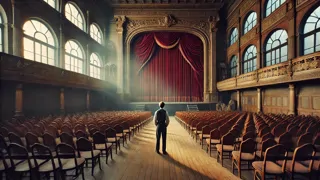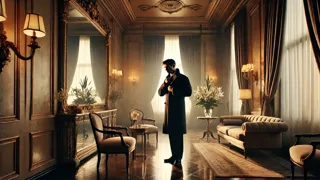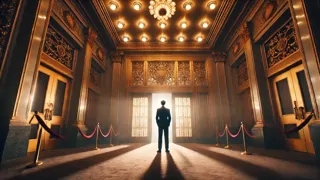Introduction
Paul awakened each morning to the shrill ring of his alarm clock in a cramped boarding house room above a row of silent brick tenements. He dressed quickly in the plain uniform his father provided—starchy white shirt, worn gray trousers—and stepped out into a world that seemed cold and indifferent. At school, teachers admonished him for dreaming too often, peers taunted any sign of sentimentality. Yet from the moment he discovered the local Opera House, with its gilded balconies and crystal chandeliers, Paul carried a private world in his heart. Between rehearsals of the school chorus and dull afternoons answering questions about algebra, he fled in imagination to those velvet-draped seats, consumed by the soft glare of footlights and the hushed anticipation of the audience. As an usher he learned every nook of the grand lobby: its marble pillars, the bronze bas-reliefs arching above the stage door, the faint musk of powder and perfume in the cloakroom. He practiced a polite bow for the well-dressed patrons and polished his shoes until the leather gleamed under gas lamps. Each night, he replayed in his mind the swish of silk gowns and the echo of soaring arias, convinced he belonged just beyond those curtains. In that gilded realm, the blandness of his real life—his father’s gruff insistence on practicality, the narrow streets of his neighborhood, the dull lessons at school—seemed as distant as the moon. Here, he felt the promise of something more: a life drenched in color and sound, possibility and applause. Yet with each visit came the gnawing realization that his dreams required currency he did not possess. Still, he planned. He saved small bits of allowance in a hidden pocket. He collected discarded tickets as keepsakes, pressing them between pages of his treasured music scores. He kept a ledger of ticket prices and carriage fares, calculating how far a small windfall might carry him. In those secret calculations, he tasted freedom. And when he stood under the marquee’s warm glow, swirling gold letters spelling out the night’s grand title, he believed—against all reason—that tomorrow might offer his entrance onto the stage itself.
Yearning for the Spotlight
Each day at Central High School felt like a quiet sentence for Paul. He sat at the back of a musty classroom, tracing the cracks in the wood grain of his desk instead of following lessons on history or grammar. Friends whispered that he was odd for preferring the hush of the empty auditorium to the raucous cheers of the baseball team. And every afternoon, once the final bell rang, he hurried to the grand Opera House on Penn Street, where his job as an usher felt more important than any lecture. He learned the names of regulars—Mr. Warfield, the banker; Miss Crane, the journalist—and greeted them with a precise nod. Under the chandeliers, he watched their carriage-clad arrivals, their silk wraps and polished shoes, and he envied them the ease of belonging to that world. In the house lights’ glow, Paul inhaled the scent of crushed velvet and dust motes drifting on beams of light. He watched from the wings as dancers pirouetted, sopranos hit crystal notes, and the audience melted into hushed reverence. When the overture swelled, his heart pounded with longing. Yet after the final bow, he returned home through crowded tenements and alleys slick with coal dust, the echo of applause fading behind him.\n\nAt home, his father’s disapproval was immediate and unyielding. He believed in practical work—bricklaying, factory labor—and scoffed at Paul’s dream of “fiddling around with singers and stagehands.” His mother watched silently from the kitchen door, worry etched in thin lines across her forehead. She had gathered china teacups and tablecloths for her son’s hopes but found only empty plates to set before him. Paul pushed past her gentle reproaches and retreated to his room, a single bed perched under a window that overlooked a smoky skyline. There, he took out his small stack of program tickets and studied them like precious maps, plotting imaginary escapes from every side street. Each stub represented a world apart from the coal tally at the door and the hum of factory whistles that counted out the hours of his townsmen’s days.\n\nIn the flicker of dusk, he would light a single candle, tracing notes on the margins of his hymnals. He imagined himself slipping into a black tailcoat, stepping out onto a grand stage as the orchestra began to play. Envisioning himself center stage, he felt the weight of expectation shift from his own shoulders onto a collective gasp of admiration. He might never master an aria, but the idea of that power—of being at the very heart of that illuminated world—was enough to sustain him. And so he saved. He skimmed a few pennies from his father’s tool chest fund, hid coin after coin in envelopes beneath the floorboard, and watched them accumulate like dim stars gathering overhead. With each new addition, his conviction grew: one day, he would pay his way beyond the curtain, into the brilliant realm he already called home in his mind.\n\nAt fourteen, Paul felt the first stirrings of desperation. He overheard whispers of wealth—stories of heirlooms sold in the city, of handsome gifts exchanged in lavish suites. He clutched his ledger and calculated that if he could secure five hundred dollars—more money than he had ever imagined touching—he could purchase clothing that would pass for inheritance, purchase tickets that would usher him permanently past the ushers like himself. He rehearsed his story: “My uncle in New York left me a sum.” He practiced the accent, the calm composure. Some nights, lying in bed, he asked himself if stealing a few bills might be less dishonorable than living a lie. But shame—and fear—tied his tongue. He would bide his time. He would wait for the moment the stage manager’s purse lay forgotten somewhere in the gloom of the wings.

A Glimpse of Glamour
Through a combination of audacity and desperation, Paul managed to lift a small roll of bills from the theater’s cash desk after a late rehearsal. His heart thundered as he counted the crisp notes beneath his coat—an amount far more considerable than his hidden coins ever totaled. That night, he boarded a northbound train for New York City, choking on the smoky air as the locomotive whined and rattled through moonlit fields. On the platform, he replaced his patched coat with a borrowed overcoat draped across his slender frame and boarded an electric tram that glowed with neon advertisement signs. As the city unfolded before him with its riot of lights and cacophony of voices, Paul felt an exhilarating surge. He stepped into the lobby of an opulent hotel, gasping at the towering ceilings, marble pillars, and a receptionist who looked at him with mild curiosity rather than suspicion.\n\nIn the grand suite he rented with shaky bravado, Paul discovered the full intoxication of luxury. He draped silk scarves over the furniture, inhaled the scent of fresh lilies, and turned on every lamp to banish shadow. He ordered food on silver trays, tasted champagne that fizzed and sang on his tongue, and found himself reflected in gilded mirrors from ceiling to floor. In each reflection, he saw a version of himself he barely recognized—a youth transformed by finery and attention, a presence that seemed to ripple confidence for the first time. He practiced small talk in the hallway, greeting other guests with a measured nod. He slipped out after dawn, wandering past carriage dealerships and high-end shops, dreaming of how it would feel to be welcomed into that world instead of looking on from its fringes.\n\nFor a blissful week, Paul floated in borrowed grandeur. At the theater in Manhattan’s roar, he slipped on a tuxedo coat embroidered in silver thread, and when a kindly usher offered him a program, he claimed a friend’s invitation. He sat in a velvet box, head high, drink in hand, exulting in a sense of belonging. Music soared as the curtain rose, and tears came unbidden to his eyes—tears of relief and wonder and pride that his dreams were, even for a moment, realized. But beneath the surface shimmer, anxiety gnawed. He knew the money was borrowed time. A clerk might discover an unpaid bill, a phone call might arrive for the missing cash. He pressed the note to his chest and resolved to savor every second before reality caught up.\n\nIn quiet corners of that suite, Paul drafted letters to his family in Pittsburgh—letters promising a glorious future and lessons learned in the art of success. He imagined returning with new clothes, new tones in his voice, and tales of midnight soirées in smoky jazz clubs. He practiced kisses on hand bundles of silk linens, crafting an identity of ease and refinement. He believed that when he did return, he would never again have to hide his hunger for beauty. Yet the weight of debt pressed on him like a silent threat, and he rarely slept more than a few hours before fear crept back into his dreams. Still, each dawn brought a new surge of desire: the wish to break free permanently, to leave behind the coal and iron of home for gilded rooftops and orchestral fanfare.\n\nOn the seventh morning, as pale light filtered through curtains, Paul dressed in hopeful determination. He practiced a final patter for a banker or benefactor who didn’t exist, touched his reflection gently, and stepped out into the wide, awakening city—knowing that every adventure has its end and that his own might come sooner than he dared to admit.

The Weight of Illusion
The morning he boarded a southbound train for Pittsburgh, Paul carried an empty suitcase and a head full of resolve. He felt victorious as the cityscape receded behind him, breathing in the smoky air of the steel mills with a sense of solid purpose. Yet each clack of the rails seemed to echo warnings he refused to heed. He told himself that once home, he would secure legitimate work or find a patron to sponsor his ambitions. He rehearsed lines about education and perseverance—empty speeches that would mask the truth.\n\nBack in his boarding house, faces grew pale as he stepped through the doorway in his tailored jacket, hat cocked to one side. His mother rushed to embrace him, tasting worry on her lips before relief. His father, sleeves rolled up from brickwork, looked him over with suspicion. He offered no congratulations—only a terse question about funds to cover the hotel bill. Paul’s throat tightened. He faltered, then produced a faded check he claimed came from a distant relative. His father folded his arms, studied the paper, and finally exhaled a grunt of grudging acceptance. For one shining afternoon, Paul walked through the familiar streets with the demeanor of a returning hero, his family trading glances of pride and surprise. But beneath that veneer, shame roiled like a hidden tide.\n\nHe returned to the Opera House, hoping that routine would soothe his conscience. He resumed his place among the other ushers, scanning programs and guiding patrons with practiced courtesy. When asked where he’d been, he replied simply, “Visiting family.” But every corner held a memory now tainted by deception. The oak banister he polished each night felt rough under his palm, a constant reminder of the truths he could no longer face. And at home, the silent grief in his mother’s eyes stung more than any reproach. She knew something was off, sensed the weight of borrowed splendor, and worried for the son whose dreams had outpaced his honesty.\n\nAs days passed, the forgery in his check came to light. Letters arrived demanding payment, inquiries circulated—and Paul watched the walls close in. The ledger hidden beneath his floorboard lay empty now; his stash of bills gone. His father’s disappointment became a leaden atmosphere, his mother’s tears a silent requiem. Each afternoon in the theater, he found himself unable to meet the audience’s gaze, the footlights now burned with accusation. The luxury of the city was gone, but its ghost clung to his mind like a fever. He conducted the intermission crowd with trembling hands, listening to laughter that felt harsh in his ears. He craved escape, yet knew no refuge.\n\nOne dawn, he left a note on his bed and slipped out into the empty streets. The sky burned in bruised shades of pink and gold as he made his way to the Monongahela River Bridge. Beneath, the water moved on in careless oblivion. Paul stood at the railing, the city yawning behind him, and realized his illusion had fractured beyond repair. In that moment, the glamour he had worshiped and the safety he had rejected merged into something unbearably sharp. He closed his eyes and let go. The world tipped, and everything went still.

Conclusion
In the hush that followed, Pittsburgh awoke to whispers of Paul’s absence. The boarding house buzzed with rumor, the Opera House manager asked about the missing usher, and in classrooms, students spoke in hushed tones about dreams that carried young men too far from those who loved them most. Paul’s tragedy became a cautionary tale for parents and teachers alike, a stark reminder of how the pursuit of beauty and status—when fueled by desperation and isolation—can shatter both the dreamer and the dream. Yet amid sorrow, there remained a flicker of understanding: that longing for wonder is itself a potent spark of humanity. Paul’s life, brief and luminous, urges us to hold our aspirations gently, to temper ambition with honesty, and to seek connection instead of isolation. In honoring his memory, we learn that true freedom lies not in the grandest theater or the silkiest coat but in the acceptance of our own stories, however humble their stage.


















